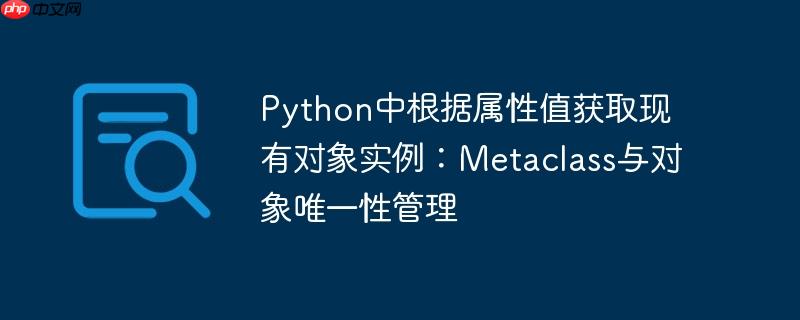
在python中,当我们通过classname(...)语法调用一个类时,python的默认行为是创建一个全新的对象实例。例如,考虑以下简单的tree类定义,它用于构建一个树形结构:
class Tree:
def __init__(self, name, cell=""):
self.name = name
self.cell = cell
self.children = []
self.parent = None
def add_child(self, child):
child.parent = self
self.children.append(child)
# 示例操作
node = Tree("A", cell="A_cell")
node.add_child(Tree("B", cell="B_cell"))
node.add_child(Tree("C", cell="C_cell"))
# 尝试通过名称获取对象
print(Tree("B").cell)在上述代码中,我们期望print(Tree("B").cell)能够输出"B_cell",因为我们已经创建了一个名为"B"且cell为"B_cell"的Tree实例。然而,实际输出却是空字符串""。这是因为Tree("B")这一行代码创建了一个全新的Tree实例,其cell属性因未指定而默认为空字符串。这个新实例与之前通过node.add_child(Tree("B", cell="B_cell"))创建的那个实例是完全不同的两个对象。
这种默认行为在许多场景下是合理的,但在需要根据某个唯一标识符(如name)来检索或确保对象唯一性时,就会带来挑战。
为了解决上述问题,我们需要改变类的实例化行为,使其在创建新对象之前,先检查是否已存在具有相同唯一标识符(例如name)的对象。如果存在,则返回现有对象;否则,才创建新对象。这种模式类似于单例模式,但其唯一性是基于某个属性值而非整个类。
Python的元类(Metaclass)提供了一种强大的机制来控制类的创建过程,包括实例化的行为。通过重写元类的__call__方法,我们可以在每次调用类(即Tree(...))时截获并自定义实例的创建逻辑。
立即学习“Python免费学习笔记(深入)”;
我们将创建一个名为MetaTree的元类,并使用一个字典来存储已创建的Tree实例,以name作为键。为了避免内存泄漏(即当对象不再被其他地方引用时,元类中的字典仍持有其引用),我们使用weakref.WeakValueDictionary。WeakValueDictionary会自动移除那些不再有强引用的键值对。
import weakref
class MetaTree(type):
# 使用WeakValueDictionary存储实例,name作为键
instances = weakref.WeakValueDictionary()
def __call__(cls, name, cell=""):
# 尝试从instances中获取指定name的实例
if not (instance := cls.instances.get(name)):
# 如果不存在,则创建新实例
instance = cls.__new__(cls) # 调用类的__new__方法创建原始对象
instance.__init__(name, cell) # 调用类的__init__方法初始化对象
cls.instances[name] = instance # 将新实例存储起来
return instance # 返回现有或新创建的实例现在,我们将MetaTree元类应用于Tree类。这通过在类定义中指定metaclass=MetaTree来完成。
class Tree(metaclass=MetaTree):
def __init__(self, name, cell=""):
self.name = name
self.cell = cell
self.children = []
self.parent = None
def add_child(self, child):
child.parent = self
self.children.append(child)
# 改进后的示例操作
node = Tree("A", cell="A_cell")
node.add_child(Tree("B", cell="B_cell"))
node.add_child(Tree("C", cell="C_cell"))
node.add_child(Tree("D", cell="D_cell"))
# 再次尝试通过名称获取对象
print(Tree("B").cell)运行上述代码,现在print(Tree("B").cell)将正确输出"B_cell"。这是因为当Tree("B")被调用时,MetaTree的__call__方法会检查instances字典。它发现一个名为"B"的Tree实例已经存在,于是返回了那个现有实例,而不是创建一个新的。
上述元类方案的核心在于name属性的唯一性和稳定性。如果一个实例的name属性在创建后被修改,将会导致系统行为混乱,因为元类仍然会根据旧的name来检索对象,或者新的name会导致创建重复的对象。
例如:
node_b = Tree("B", cell="B_cell")
node_b.name = "X" # 修改了name属性
print(Tree("B").cell) # 仍然会返回node_b,但其name已是"X",语义混乱
print(Tree("X").cell) # 可能会创建新的"X"对象,或者如果"X"已存在,返回另一个对象为了维护基于name属性的对象唯一性,我们应该确保name属性在对象创建后是不可变的。在Python中,实现严格的不可变性通常比较复杂,但我们可以通过使用@property装饰器来提供一个只读属性,从而避免意外修改。
通过将name属性存储在一个私有变量(如_name)中,并提供一个只读的@property,我们可以有效地防止外部代码直接修改name。
import weakref
class MetaTree(type):
instances = weakref.WeakValueDictionary()
def __call__(cls, name, cell=""):
if not (instance := cls.instances.get(name)):
instance = cls.__new__(cls)
instance.__init__(name, cell)
cls.instances[name] = instance
return instance
class Tree(metaclass=MetaTree):
def __init__(self, name, cell=""):
self._name = name # 存储在私有变量中
self.cell = cell
self.children = []
self.parent = None
@property
def name(self):
"""提供只读的name属性"""
return self._name
def add_child(self, child):
child.parent = self
self.children.append(child)
# 示例操作
node_a = Tree("A", cell="A_cell")
node_b = Tree("B", cell="B_cell")
node_a.add_child(node_b)
print(Tree("B").cell) # 输出: B_cell
# 尝试修改name属性,这会引发AttributeError
try:
node_b.name = "X"
except AttributeError as e:
print(f"尝试修改只读属性失败: {e}")
print(Tree("B").name) # 仍然是B通过这种方式,name属性在对象创建后就成为了只读的,任何尝试通过instance.name = "new_name"直接修改它的行为都会引发AttributeError,从而增强了系统的健壮性和一致性。
本文详细介绍了如何在Python中利用元类(Metaclass)及其__call__方法,实现根据特定属性值(如name)来管理和检索对象实例的机制。这种方法有效地解决了默认对象创建行为带来的问题,使得Tree("B")能够返回现有而非全新的对象。同时,我们强调了确保用于唯一性标识的属性(如name)不可变的重要性,并提供了通过@property装饰器创建只读属性的最佳实践,以增强代码的稳定性和可靠性。在设计需要基于某些数据字段进行对象唯一性管理或实现类似“按需单例”模式时,元类是一个非常强大且灵活的工具。
以上就是Python中根据属性值获取现有对象实例:Metaclass与对象唯一性管理的详细内容,更多请关注php中文网其它相关文章!

每个人都需要一台速度更快、更稳定的 PC。随着时间的推移,垃圾文件、旧注册表数据和不必要的后台进程会占用资源并降低性能。幸运的是,许多工具可以让 Windows 保持平稳运行。

Copyright 2014-2025 https://www.php.cn/ All Rights Reserved | php.cn | 湘ICP备2023035733号